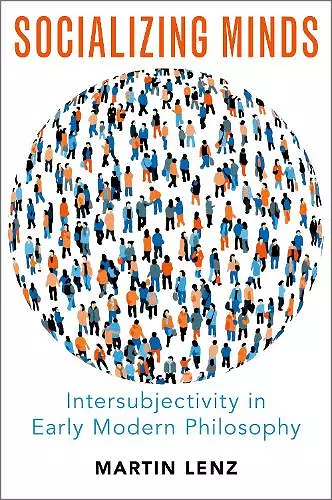Socializing Minds
Intersubjectivity in Early Modern Philosophy
Format:Hardback
Publisher:Oxford University Press Inc
Published:17th Oct '22
Currently unavailable, and unfortunately no date known when it will be back

In this book, Martin Lenz provides the first reconstruction of intersubjective accounts of the mind in early modern philosophy. Some phenomena are easily recognised as social or interactive: certain dances, forms of work and rituals require interaction to come into being or count as valid. But what about mental states, such as thoughts, volitions, or emotions? Do our minds also depend on other minds? The idea that our minds are intersubjective or social seems to be a recent one, developed mainly in the 19th and 20th centuries against the individualism of early modern philosophers. By contrast, this book argues that well-known early modern philosophers often started from the idea that minds are intersubjective. How then does a mind depend on the minds of others? Early modern philosophers are well known to have developed a number of theories designed to explain how we cognize external objects. What is hardly recognized is that early modern philosophers also addressed the problem of how our cognition is influenced by other minds. This book provides a historical and rational reconstruction of three central, but different, early modern accounts of the influence that minds exert on one another: Spinoza's metaphysical model, Locke's linguistic model, and Hume's medical model. Showing for each model of mental interaction (1) why it was developed, (2) how it construes mind-mind relations, and (3) what view of the mind it suggests, this book aims at uncovering a crucial part of the unwritten history of intersubjectivity in the philosophy of mind.
Sometimes the hardest thing to do in philosophy is to ask a new question ... Martin Lenz's great accomplishment in his erudite and thought-provoking book ... is his formulation of a new question by which to investigate the early modern philosophers ... And by bringing Spinoza, Locke, and Hume into conversation with one another, he allows his distinctive take on each to illuminate the others. ... [R]eadings of the philosophy of this period will henceforth have to address the question of intersubjectivity that Lenz has so ably uncovered. * Donald Ainslie, Mind *
Martin Lenz has given us a powerful and thought-provoking critique of a historiographical orthodoxy. * Susan James, British Journal of History of Philosophy *
We students of the early modern period should be doubly grateful for Martin Lenz's new book.... For the project is doubly generative, introducing a robust new conceptual framework, and then putting it through its paces with some fascinating case studies. I look forward to watching others adapt the framework in the service of their own interpretive projects, as well as reckon with Lenz's fecund readings of Spinoza, Locke, and Hume. * Kathryn Tabb, British Journal of History of Philosophy *
Lenz's book is hardly the last word on this topic, and there is much to consider regarding the extent to which intersubjectivity was arising among early modern philosophers. Lenz does us a great service in pushing us to consider more carefully how much of the early moderns' philosophical framework was intersubjective. * Benjamin Hill, Journal of the History of Philosophy *
ISBN: 9780197613146
Dimensions: 137mm x 201mm x 28mm
Weight: 431g
272 pages